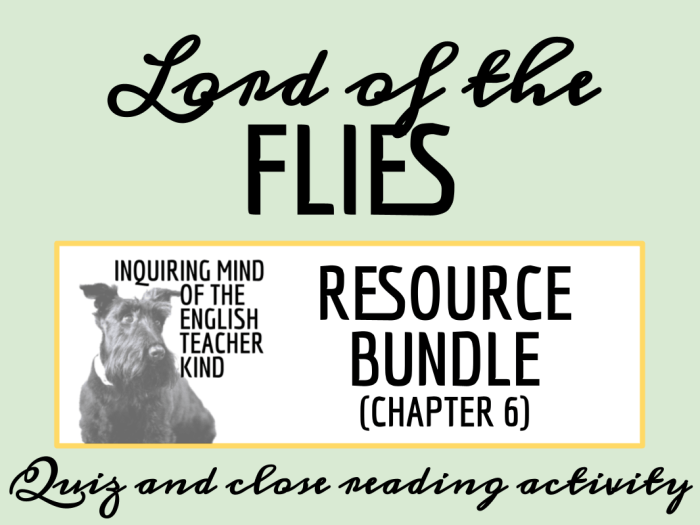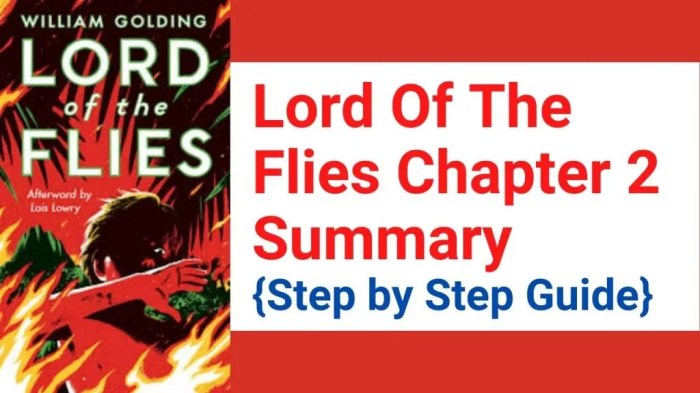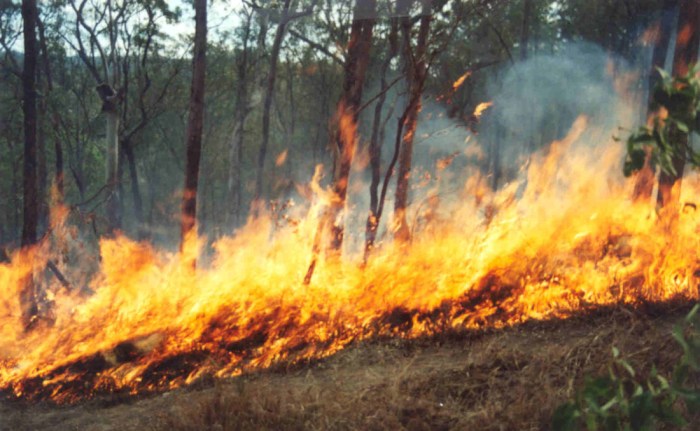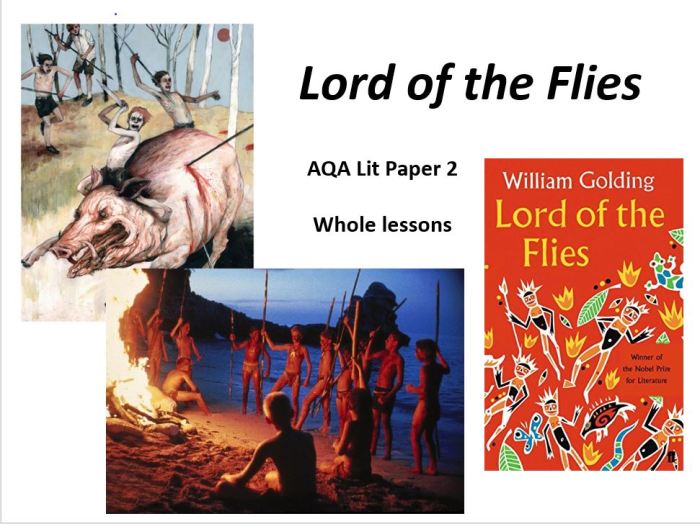Embark on an intellectual journey with our Lord of the Flies Chapter 6 Quiz. Dive into the heart of William Golding’s literary masterpiece as we unravel the profound themes, symbolism, and character development that define this pivotal chapter.
Through a series of thought-provoking questions, you will explore the complexities of human nature, the fragility of civilization, and the enduring power of fear and violence.
Character Development

The characters in Lord of the Fliesundergo significant transformations as they adapt to the challenges of living on a deserted island. Ralph, Piggy, and Jack all emerge as complex and compelling characters, each representing different aspects of human nature.
Ralph’s Evolution from Leader to Savage
Ralph begins the novel as a responsible and charismatic leader. He is elected chief by the other boys and quickly establishes a system of rules and order. However, as the boys descend into savagery, Ralph’s authority is increasingly challenged. He becomes frustrated and disillusioned, and his behavior becomes more impulsive and violent.
By the end of the novel, Ralph has lost all semblance of his former self and has become a savage himself.
Piggy’s Intelligence and Rationality, Lord of the flies chapter 6 quiz
Piggy is the only boy on the island who possesses any real intelligence. He is logical, rational, and pragmatic. However, his intelligence is also his weakness. The other boys often mock and belittle him, and he is unable to defend himself physically.
Piggy’s death at the hands of the savages is a tragic reminder of the dangers of being different.
Jack’s Transformation from Choirboy to Dictator
Jack is a complex and contradictory character. He is initially presented as a choirboy, but he quickly emerges as a ruthless dictator. Jack’s transformation is driven by his desire for power and control. He is able to manipulate the other boys by appealing to their fears and instincts.
By the end of the novel, Jack has become a savage who rules through fear and violence.
Thematic Analysis

The theme of civilization versus savagery permeates Lord of the Flies, as the boys struggle to maintain order and morality amidst the chaos of their isolated island existence. As they descend into savagery, the conch, once a symbol of order and authority, becomes increasingly irrelevant.
Civilization vs. Savagery
- The boys’ initial attempts at self-governance, such as the election of Ralph as chief and the establishment of rules, represent their desire for civilization.
- However, as fear and violence escalate, their civilized instincts erode, replaced by primal instincts and the law of the jungle.
- This descent into savagery is evident in the boys’ increasing reliance on violence, their disregard for the rules, and their persecution of those who dissent.
The Significance of the Conch
- The conch symbolizes order and authority, and its presence initially helps to maintain a semblance of civilization among the boys.
- However, as the boys’ savagery increases, the conch’s significance diminishes, and it is eventually shattered by Jack.
- This destruction of the conch symbolizes the complete breakdown of order and the triumph of savagery over civilization.
The Role of Fear and Violence
- Fear and violence play a crucial role in the boys’ descent into chaos.
- Fear of the unknown, such as the beast, drives the boys to seek safety in violence.
- Violence, in turn, begets more violence, creating a vicious cycle that ultimately consumes the boys.
Symbolism and Imagery

Chapter 6 of Lord of the Fliesis rich in symbolism and imagery that contribute to the novel’s exploration of themes such as the duality of human nature, the dangers of power, and the loss of innocence.
The Island as a Microcosm
The island on which the boys are stranded serves as a microcosm of the world outside. It is a closed environment, cut off from the civilizing influences of society, where the boys’ true nature is revealed. The island’s lush vegetation and abundance of resources initially provide a sense of paradise, but as the boys’ descent into savagery progresses, the island becomes a symbol of chaos and violence.
The Fire
The fire is a powerful symbol with multiple meanings. It represents hope and warmth, providing light and protection for the boys. However, it also becomes a destructive force, leading to the destruction of the island’s vegetation and the death of Piggy.
The fire symbolizes the duality of human nature, capable of both creation and destruction.
Foreshadowing and Suspense

Golding employs several techniques to create a sense of foreboding and suspense in chapter 6 of Lord of the Flies. Foreshadowing, the subtle hinting at future events, is a key element in building tension throughout the chapter.
Foreshadowing
- Ralph’s isolation:Ralph’s increasing isolation from the group foreshadows his eventual downfall. As the chapter progresses, he becomes more and more isolated, with even Piggy expressing doubts about his leadership.
- Simon’s encounter with the Lord of the Flies:Simon’s encounter with the Lord of the Flies foreshadows the savagery and violence that will consume the boys. The Lord of the Flies represents the evil that lurks within the boys, and its appearance foreshadows the darkness that will soon overtake the island.
Suspense
Golding also creates suspense through the use of various techniques:
- Ambiguous language:Golding’s use of ambiguous language creates a sense of uncertainty and unease. For example, the boys’ chant, “Kill the beast! Cut his throat! Spill his blood!” is both exciting and terrifying, leaving the reader uncertain about what will happen next.
- Tension between characters:The growing tension between Ralph and Jack creates a sense of suspense. The reader is constantly aware of the potential for conflict between the two leaders, and this tension builds throughout the chapter.
The Hunt
The hunt plays a significant role in building suspense and foreshadowing future events. The hunt itself is a violent and chaotic event, and it foreshadows the violence that will soon erupt among the boys. Additionally, the hunt provides a glimpse into the savagery that is lurking within the boys, and it foreshadows the dark events that will unfold in the chapters to come.
Literary Devices: Lord Of The Flies Chapter 6 Quiz
Chapter 6 of Lord of the Flies showcases the author’s skillful use of literary devices to create a vivid and immersive experience. Irony, metaphor, and simile play significant roles in enhancing the chapter’s themes and character development.
Irony
- Dramatic Irony:The reader’s knowledge that Piggy’s spectacles are essential for the group’s survival contrasts with the boys’ ignorance, creating a sense of impending doom.
- Situational Irony:The boys’ attempts to establish order and civilization ultimately lead to chaos and violence, highlighting the inherent flaws in their society.
Metaphor
The conch shell serves as a powerful metaphor for civilization and order. Its fragility and eventual destruction symbolize the decline of the boys’ society.
Simile
Similes are used to create vivid imagery and emphasize the boys’ physical and emotional states. For example, Piggy’s “fat, treacly voice” suggests his vulnerability, while the boys’ “faces like masks” conveys their detachment from their true selves.
Language and Style
Golding’s use of vivid language and sensory details immerses the reader in the boys’ world. The frequent use of short, choppy sentences reflects the boys’ primal instincts and the chaotic nature of their society.
Structure
The chapter’s structure contributes to its overall narrative. The gradual disintegration of the boys’ society is mirrored in the chapter’s shifting perspectives and fragmented events.
FAQ Overview
What is the significance of the conch in Lord of the Flies Chapter 6?
The conch symbolizes order, authority, and the remnants of civilization among the boys. Its destruction marks a turning point towards chaos and savagery.
How does Ralph’s character evolve in Chapter 6?
Ralph’s responsible leadership qualities begin to erode as he struggles to maintain order amidst the growing savagery. He becomes increasingly isolated and disillusioned.
What is the role of fear in the boys’ descent into chaos?
Fear of the unknown, the beast, and each other fuels the boys’ paranoia and violence. It leads them to abandon reason and embrace primal instincts.